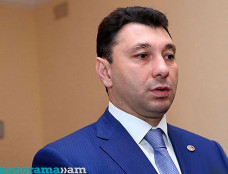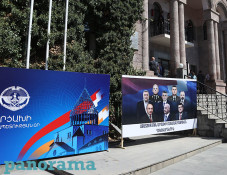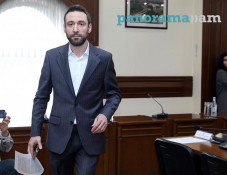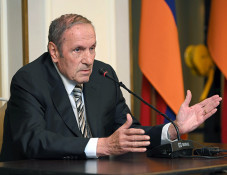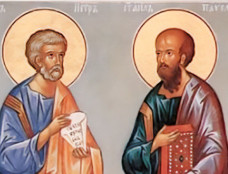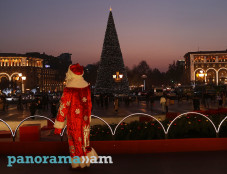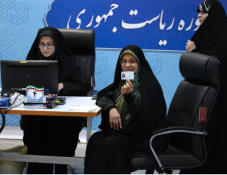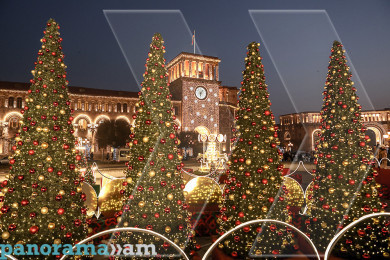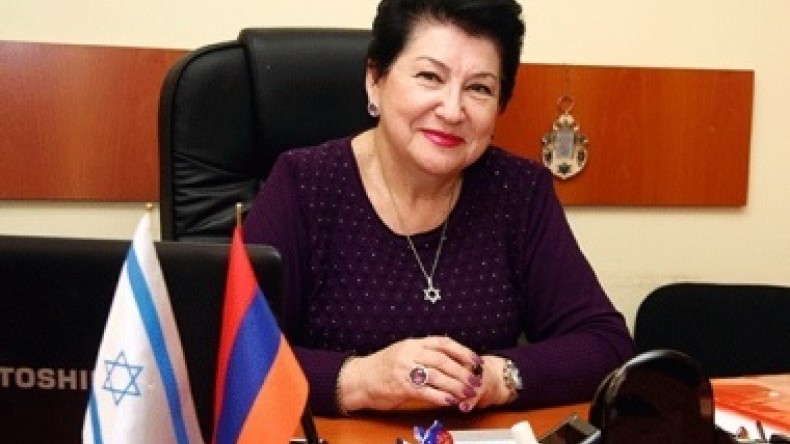
Never again. «If I had power, I would introduce an 11th commandment»
On January 27 an international gathering dedicated to the 70th anniversary of the liberation of Auschwitz–Birkenau Nazi concentration and extermination camp was organized in Polish town of Oswiecim.
Even though this was the most important ceremony on the International Day of Commemoration in Memory of the Victims of the Holocaust, some more commemoration events and ceremonies also were organized in various corners of the world, and primarily in those countries that have Jewish communities.
Naturally, Armenia did not stand by idly in yet again condemning one of the gravest crimes against humanity and memorial ceremonies were organised. Representatives of Armenian diplomatic missions partook in the international gathering in Auschwitz, as well as in memorial ceremonies in other countries of the world.
In Armenia, too, Holocaust commemoration events were organized, the main event being held in capital Yerevan at the Holocaust Memorial site, which was supported by the UN Office in Armenia. And by the way, the chairwoman of Jewish community in Armenia Rimma Varzhapetyan-Feller received an invitation to take part in the ceremony held in Oswiecim, yet she told Panorama.am that she did not go to Poland since she felt it’s more important and necessary to be at the January 27 events in Yerevan.

At the ceremony initiated and supported by the UN Office in Armenia, together with the representatives of Jewish community in Armenia, the event was attended by Deputy Foreign Minister Sergey Manasaryan, UN Resident Coordinator in Armenia Bradley Busetto, the director of Armenian Genocide Museum-Institute Hayk Demoyan, and other high-level state officials and foreigners. The attendees laid flowers and wreaths at the Memorial, which was followed by candlelight vigil. The ceremony concluded with a prayer by the chief Rabbi of Armenia Gersh Burshteyn.
On January 27 another Holocaust commemoration event was organized in Armenian National Library, again with the support of UN Office in Armenia, where exposition of evidences and documents presented the history of Second World War and the Holocaust. A special presentation was offered on how the Armenian media had covered the topic of Holocaust at the time. The chairwoman of Jewish community in Armenia Rimma Varzhapetyan-Feller, as well as Bradley Busetto and Willy Weiner made speeches at the event. The event at the Armenian National Library concluded with performance of a prominent Jewish composer in Armenia, chairman of the Jewish Cultural Center «Menora», Willy Weiner’s somber music.
Both in Armenia and across the globe the very keyword of all speeches commemorating the Holocaust was the call not to forget the crimes against humanity. One of the best wordings on this issue was uttered by an Auschwitz survivor speaking in Oswiecim: «If I had power, I would introduce an 11th commandment: you must never stand by idly and just follow it».
This opinion was also shared by Rimma Varzhapetyan-Feller, who made an address to the attendees on behalf of the Jewish Community in Armenia, the chairman of the Jewish Cultural Center «Menora» and the chief Rabbi of Armenia:
«The non-condemned and unrecognized historical fact of Armenian Genocide of early XX century led to Holocaust and new genocides [elsewhere]. Being conscious of sad historical heritage that our two nations share, we shall spare no efforts so that the heinous pages of history won’t repeat themselves. Regardless of geopolitical or whatever other interests, the international community shall display a total solidarity in recognizing, condemning and preventing all genocides. Being part of the Jewish nation, we address our call to everyone that shares our pain and appeal. «The days of commemoration of any of crimes against humanity – the Shoah (Holocaust), Armenian Genocide (Mets Yeghern), the days of commemoration of the victims in Cambodia, Rwanda, Darfur, as well as other days of commemoration of the victims of violence and terrorist attacks must all be days of commemoration not only for the descendants of those victims, but also for the descendants of those who perpetrated these crimes».
.jpg)
«We have no human or moral right to differentiate these two atrocities, since both are tragedies for all humankind» - said Hayk Demoyan, drawing parallels between Armenian Genocide and the Holocaust. According to him, the reason of all genocides lies in the indifference of the international community.
Bradley Busetto prioritised the fight against xenophobia in his speech. «We pay tribute to the victims of Holocaust. Today we also reconfirm our commitment to fight against anti-Semitism and racism. The UN rejects any denial of Holocaust as a historical fact and unconditionally condemns incitement of religious intolerance, as well as any persecution and violence against individuals or communities wherever that may be».
As Albert Einstein said, «Anti-Semitism is the shadow of Jewish people». The Jewish people had been persecuted and discriminated against in various corners of the world throughout millenniums, which peaked in the years of Holocaust at the hands of Nazi Germany during the Second World War.
.jpg)
Notwithstanding the felicitous definition by a great scientist, Armenia has been welcoming representatives of Jewish people for centuries, while there has been no evidence of persecutions against Jews in Armenian environment ever recorded in history.
«Anti-Semitism, nationalism and xenophobia are alien to Armenia. Armenia is a favorable country for Jews and other national minorities to live in», Rimma Varzhapetyan-Feller highlighted in her speech on January 27.
Thus, the great scientist’s observed regularity has got discrepancies in Armenia, and Varzhapetyan-Feller explained that to Panorama.am citing numerous commonalities between Armenians and Jews, such as the fact that both nations had been escaping invasions by foreign invaders for centuries and thereby got scattered throughout the world to begin with, and eventually that both nations got traumatized by the genocide. «In our community almost everyone was born in mixed marriages, and there are numerous people whose ancestors suffered deprivations both during Armenian Genocide and the Holocaust»,- says the chairwoman of the Jewish community in Armenia.
Though the present community is rather young and got formed during the Soviet rule, which is right after the Second World War, Armenian-Jewish relations in the territory of Armenia trace back to a few millenniums. In historical accounts of all Middle Eastern nations there are pieces testifying about the accommodation of Jews in Armenia during Antiquity, whereas the Armenian historiography addresses the issue of bringing in vast numbers of Jews to live in Armenia during the rule of Tigranes the Great. There are even some Armenian noble families who has been quite powerful and famous for their patriotic service, and who are by some specialists traced back to be of Jewish origin.

One of the prominent evidences of existence of Jewish communities in Armenia is the Jewish Cemetery in Vayots Dzor region which dates back to XIII century. It was discovered in 1996 and still being studied by specialists from Armenia, Israel and United States. «As they say, this is the oldest Jewish Cemetery discovered in this region», says Rimma Varzhapetyan-Feller, referring to the evaluation of Prfessor Michael Stone from The Hebrew University of Jerusalem. As Mrs Rimma says, after the discovery of the cemetery she asked the Armenian Government to contribute to the reconstruction and recovery of the site, which was immediately done with the support of former Prime-Minister Andranik Margaryan. Presently the medieval complex is included in the list of cultural heritage sites and is protected by the state.
According to Rimma Varzhapetyan-Feller, today there are up to 1000 Jews living in Armenia.
Many Jews got established in Armenia escaping from the Nazi persecutions in other regions then under occupation. In the «Jewish Community in Armenia» handbook, published in 2012, one can find many stories telling how the representatives of Jewish people, after long wanderings finally settled on Armenian soil, formed families and started their productive activities. One of those is the story of Willy Weiner’s family. His father – Max Weiner - underwent through nearly all hardships that had then been happening to the Jews in the first half of XX century: a long trail of emigration to the United States, then to the Netherlands, then to a Nazi camp in Germany, and then to Soviet exile in Kazakhstan. Eventually, Max Weiner settled down in Yerevan, where his talented son was born and started his career.
This is just one, but not the only one from the bunch of tragic stories that those numerous Jews established in Armenia happened to live through. After all, however, they settled down in a country where the hosting nation not only shared their pain, but created environment for them to invest their talents and knowledge to contribute to meeting local challenges, to state-building and eventually for the development in various important fields. The leader of the community lists only few names: lawyer Polina Shaposhnikova, who together with Ruben Rshtuni succeeded in showing the organized character of Sumgayit massacres; Joseph Kozliner, who headed the theater after Stanislavsky in Yerevan for a number of years and earned good fame among Armenian audience, academician Igor Zaslavsky, geologist Efim Zilman who has had a great contribution in studying Armenian landscape, and many others.

According to Mrs Rimma, Jewish community members living in Armenia often visit the community and partake in community events. The members of the community, Mrs Rimma says, are busy in many fields and there are fewer occasions to get together nowadays, only on national holidays and commemoration events. Yet that doesn’t keep the community away from active service aimed at better organizing national and cultural life of the Armenian Jews, as well as having their own contribution to the development and strengthening of Armenian-Israeli relations.

Newsfeed
Videos








